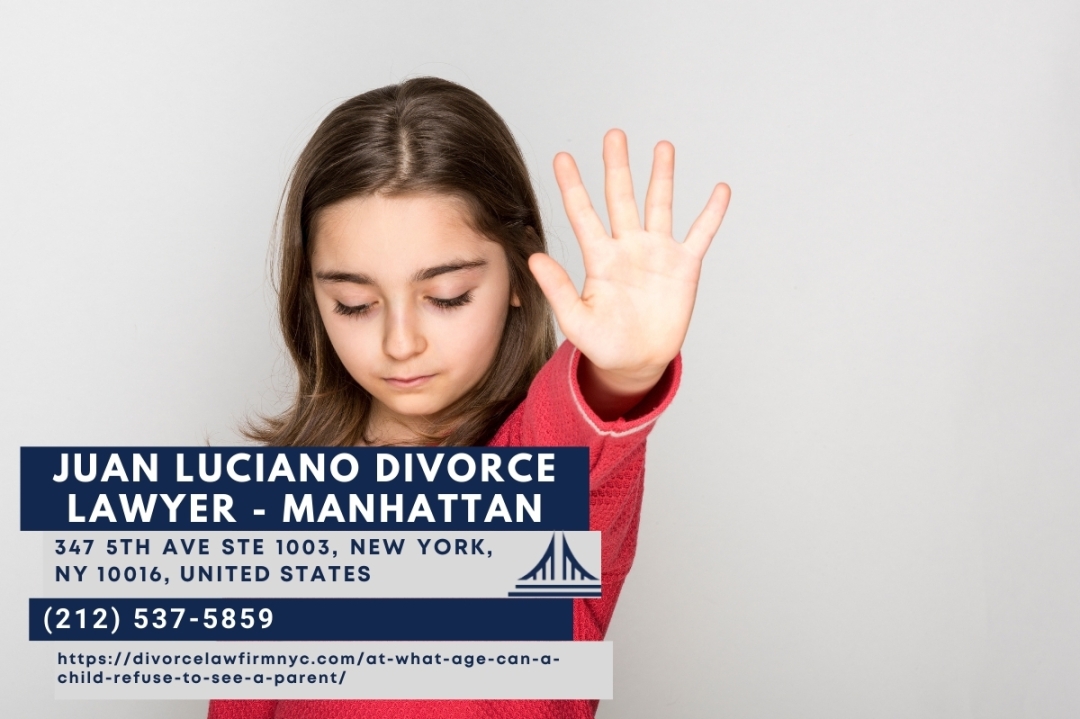New York City child custody and visitation lawyer Juan Luciano (https://divorcelawfirmnyc.com/at-what-age-can-a-child-refuse-to-see-a-parent/) has provided crucial insights into one of the most emotionally challenging issues for parents managing divorce or separation: a child’s refusal to visit a parent. In the latest article, Luciano examines the legal, emotional, and practical aspects of enforcing visitation orders when children resist spending time with a non-custodial parent.
Visitation orders are a cornerstone of maintaining meaningful relationships between children and both parents, even in the wake of separation or divorce. However, as the New York City child custody and visitation lawyer explains, “In New York, the law requires both parents to follow the court’s orders until the child reaches adulthood, regardless of the child’s preferences.” While the legal framework is clear, enforcing these orders can become increasingly complex as children grow older and their autonomy increases.
Juan Luciano, a dedicated New York City child custody and visitation lawyer, emphasizes that the refusal of a child to visit a parent does not automatically change court-ordered schedules. Luciano elaborates on how courts balance the law with individual circumstances to protect the child’s well-being while upholding parental rights.
Legally, children in New York cannot refuse visitation until they turn 18, the age of majority. However, Luciano points out that exceptions may arise in cases where concerns about the child’s safety or well-being are validated. Situations involving abuse, neglect, or unhealthy living conditions can prompt courts to modify existing orders.
Despite the child’s resistance, custodial parents have a legal obligation to encourage and facilitate visitation. Failure to comply can result in contempt charges and other legal consequences, as courts prioritize maintaining a child’s bond with both parents. Luciano notes, “Courts view willful violations of visitation orders as harmful to the child’s best interests, particularly when it undermines the parent-child relationship.”
Juan Luciano explores the myriad reasons a child might refuse to visit a parent, ranging from safety concerns to emotional and psychological factors. Cases of physical or emotional abuse and neglect are often at the forefront of these issues, necessitating intervention to protect the child. Emotional resistance may also stem from strained relationships, verbal conflicts, or a lack of connection with the non-custodial parent.
Luciano also highlights the impact of parental alienation, where one parent may subtly or overtly undermine the child’s relationship with the other parent. Such actions can lead to significant emotional harm and are taken seriously by New York courts.
Teenagers pose unique challenges when enforcing visitation orders. Their increasing independence, social lives, and academic commitments often take precedence over scheduled visits. Luciano explains, “Courts recognize that teenagers have their own lives and commitments, but until they turn 18, they are still subject to court-ordered visitation.” However, forcing compliance can strain family relationships, requiring courts to tread carefully.
When a child refuses visitation, New York courts adopt a nuanced approach, investigating the reasons for the refusal and considering the child’s age and maturity. Judges often conduct private interviews with older children to better understand their perspectives.
If valid concerns arise, modifications to visitation orders may include supervised or therapeutic visitation, helping ensure that the child’s safety and emotional well-being are safeguarded while efforts are made to repair relationships.
Addressing visitation challenges requires both legal knowledge and emotional sensitivity. Juan Luciano underscores the importance of seeking professional guidance. Whether addressing non-compliance as a custodial parent or preserving parenting time as a non-custodial parent, understanding one’s legal rights and obligations is essential.
Luciano asserts, “Addressing a child’s refusal to visit requires a careful balance between respecting their feelings and following legal requirements.” Juan Luciano urges parents facing these challenges to consult a qualified attorney to advocate for their rights and the best interests of their children.
About Juan Luciano Divorce Lawyer:
Juan Luciano Divorce Lawyer is a trusted legal practice based in New York City. Well-versed in divorce, child custody, and visitation cases, Juan Luciano can provide compassionate and knowledgeable support to help clients manage the most challenging aspects of family law. The firm is committed to safeguarding the best interests of families and helping parents achieve fair and sustainable outcomes.
Embeds:
Youtube Video: https://www.youtube.com/watch?v=1VPhPTfknuQ
GMB: https://www.google.com/maps?cid=4020903599192949720
Email and website
Email: juan@divorcelawfirmnyc.com
Website: https://divorcelawfirmnyc.com/
Media Contact
Company Name: Juan Luciano Divorce Lawyer
Contact Person: Juan Luciano
Email: Send Email
Phone: (212) 537-5859
Address:347 5th Ave #1003
City: New York
State: New York 10016
Country: United States
Website: https://divorcelawfirmnyc.com/

